- Home
- Amanda Hocking
The Ever After Page 6
The Ever After Read online
Page 6
I was doing one last sweep around the room to make sure I wasn’t leaving anything behind, and someone knocked on the bedroom door.
“Come in,” I said, assuming it was Mia or Finn, because none of the others would’ve knocked.
Instead, it was Sunniva Kroner, smiling thinly at me. She was more casually dressed than when I had seen her last—a striped crop top and skinny jeans, with her long curly hair pulled up into a messy bun. Gold hoop earrings hung in her ears and bangles sparkled on her wrists.
“Oh, alai!” I said in surprise, and then remembered in dismay that she was a high-ranking Marksinna, and I wasn’t, so I attempted a hasty bow.
Sunniva waved her hand quickly to stop me. “No, no. Don’t do that.” She surveyed the room from under her thick lashes, and her eyes landed on my bag. “Are you going somewhere?”
“Yeah, I’m visiting a friend for a few days, maybe a week. But I’ll be back.”
“Good.” She admired the handcrafted Dala horse on the twins’ dresser. “Are these handmade?”
“Yeah, at the Trylle Toy Shoppe, the owner makes them. Every kid in town has one.”
“Oh.” She set it back on the dresser. “I didn’t grow up here, so I never had one. I’m a changeling.”
“I never had one either,” I said, unsure of how else to respond.
Most of the Marksinna and Markis around her age had been changelings, meaning they had been switched at birth with children from wealthy human families and raised far away from Förening in human cities. Because of that, and the class differences, I didn’t interact with any of them very often, so I didn’t really know how any of them felt about the process.
“Anyway.” Sunniva looked back at me, her dark eyes studying me. “I didn’t come here to talk to you about toys.”
“What did you come here to talk about?” I asked.
She went back to looking around the room, and she paced slowly between the cribs as she spoke. “I’ve been training with my mother. Aurora. I don’t know if you know her.”
“I know of her,” I clarified. The Kroners were a powerful and wealthy family with strong ties to the royal family. Everyone knew of them.
Sunniva shook her head. “It doesn’t matter. Aurora’s a great healer. Was.” She paused. “Is. The powerful abilities run in my family—Tove moves things with his mind, Aurora can heal even deadly wounds, Noah has flashes of precognition. They’re all very draining and dangerous. They age you.”
“If you don’t want to do this, I understand,” I replied carefully.
“No, it’s not that. It’s the opposite of that, really.” She faced me. “It’s taking longer to get the hang of because of the amount of energy it takes. But I know I can do it. I will be able to. And I wanted to make sure you understood that you don’t have to do this. Aural healing is a volatile thing—auras don’t like being manipulated by outside sources.”
“Most things don’t,” I said.
She smiled faintly. “You should be aware of the risks.”
I considered what she was saying and then asked, “If I say that I don’t want to do this again, would you keep training and practicing your aural healing?”
“Yes, I would,” she answered without hesitation.
“Why?”
“When I found out I was a changeling, I didn’t want to come here,” she explained. “But what changed my mind was that I wanted to get a handle on the intense, superhuman things my body can do, and the only way I could find out my full potential was to come to a place where everyone understood what I am.
“That’s why I’m here. That’s why I’m learning this,” Sunniva said. “And if I can help you or others along the way, even better.”
“I can respect that,” I said. “And I’m up for it if you are.”
Sunniva smiled, deeply this time. “Excellent. I’ll keep working with Aurora and Tove while you’re gone, and when you get back, hopefully, we can meet up.”
I nodded. “I’ll see you then.”
13
Dreams
The train was trying to rock me to sleep, but it wasn’t helping. I lay in the narrow bed, watching out the long window as the boreal forest slowly passed by under the moonlit sky.
Doldastam—the capital of the Kanin kingdom—was located in the Canadian subarctic, nestled along the Hudson Bay. It was so far north, it was only accessible by train or plane, and train was the far cheaper option. It also took a lot longer. It was only my first night “riding the rails,” and I had one more night to go.
It wasn’t so bad, though. I had gotten an upper-berth bed, the upper window gave me a beautiful view of the Canadian wilderness in full summer bloom, and now I had plenty of time to worry about everything.
The last time I’d been this far north had been five and a half years ago, after the Invasion of Doldastam. Finn’s younger sister Ember had fought beside Bryn during the war, and she’d been killed during combat. After the war ended and the new Kanin King, Linus Berling, was crowned, he held a ceremony in remembrance of all the lives lost.
I had gone there with Finn and Mia, and we had stayed with Finn’s parents—who had lived in Doldastam then—for a few days. Most of the time had been spent grieving and helping the Holmeses, but I had snuck in a quick visit with Bryn.
That was the only time I had ever been to Doldastam. The handful of times I had seen Bryn since then had been when she came south to Förening, working as the King’s personal guard.
The village I grew up in, Iskyla, was even farther north and more isolated. The only road out of town went to a neighboring Inuit village, and it went no farther. They did trading with the humans by boat and plane—that’s how my foster father got his art books and travel magazines, and when I was older, that’s where I’d go to buy old paperbacks and movies from their meager store.
I had never been farther south than Iskyla, not since I’d been left as a baby. Not until Bryn rolled up in the middle of winter. My foster family—Oskar and Hilde Tulin—owned a small inn. In the winter, there were hardly any guests, and the few guests we did have were almost always townsfolk that needed a night away from their own home for one reason or another.
In the summer, we got the occasional lost tourist or adventurist hikers—I found no fewer than four different battered copies of Into the Wild forgotten in the rooms after they checked out of the inn—but most of the guests were workers passing through, from the southern cities to the mines and the lakes.
Bryn had come looking for the truth behind the dynasty controlling her kingdom, and she’d found the answer, with my help because I knew everybody in town. I was only fourteen then, but I knew the options in Iskyla—for work, for love, for friendship, for finding my parents—were very slim, and I saw a chance to escape, so I took it.
Mr. Tulin tried to give me a good life, but life in Iskyla is hard, and Mrs. Tulin never saw me as anything more than a burden. After I left, I kept in touch with Mr. Tulin, mostly through letters, but last winter, he stopped replying. A month later, Mrs. Tulin sent me a small package and a letter, telling me he’d passed away.
The package contained what little memorabilia she still had from my childhood. A few medical and school records, a few photographs, and a small painting that Mr. Tulin had done.
And now I was riding right back into my history, and it left me feeling sick and anxious. Lying in bed, staring out at the darkness, reminded me of the cold nights alone in the inn, listening to the wind howling at the feeble windows, with frost so thick over the panes, I couldn’t see outside.
On the train by myself, I felt sad and alone. I missed my friends, my family—both the ones I had and the ones I never had the chance to really know.
But the exhaustion of the travel wore me down. My earbuds played the Carpenters, and I cried softly into my pillow as I finally drifted off to sleep.
The sound of the ocean woke me up—the crashing waves and far-off gulls calling to one another, but faintly behind that, I still heard Karen Carpe
nter singing, demanding to know if a superstar still remembered her. I opened my eyes, and I was on the beach in Oregon, just beyond the city walls of Merellä, and the sharp drop-off around them. I looked back at the citadel, towering above me, and the only gap in the stone wall was the crescent-shaped arch that let the Forsa River flow easily underneath.
I’d gone through that once, walking along the narrow banks, out to where the dirt and mud became pebbles and sand. That’s where Hanna and I had found Eliana, hiding from a Shadow and a Dragon—Illaria and Sumi.
But now I was alone, with frothy waves crashing onto the rocky beach. A sharp pebble stung the bottom of my bare foot, and I felt the cool spray from the ocean. All the while, the Carpenters’ mournful melody played on, somewhere nearby.
“Ulla!” Pan’s voice was behind me, and I whirled around to see him standing there.
An unsure smile played on his full lips, and his warm, dark eyes were full of longing. He wore an amethyst button-up shirt, with the top few buttons undone. With the wind sweeping through his wavy black hair, he looked like a fashion model.
His hair was longer than I remembered it, curling just below his ears, and I had the strongest urge to run my fingers through it.
“Pan.” I threw my arms around him, and he held me to him and lifted me up off the ground.
When he set me back down, I pulled back so I could look him fully in the face. I wanted to study every part of it—his deep-set eyes behind thick lashes, his high cheekbones, and the subtle crooked smile on his lips that never completely went away. At least not when we were together.
“This is a dream, isn’t it?” I asked him sadly.
“Sort of, but I am really here,” he said with a wink.
“What?”
“It’s a lysa,” he explained. “I’ve only done this once before. Dagny had to walk me through the whole process, and I’m not very good at it so I had to wait until you fell asleep. There’s a way that you can pull someone into a lysa even when they’re awake, but it’s a lot harder.”
A lysa was similar to a persuasion, in that almost all trolls could do it and almost no humans could. I’d never had one before, but I had learned about them in school. They weren’t very common, since it was far more tiring to astral project somewhere than it was to use a cell phone.
It was sort of like a dream, if the dream was really happening on the astral field. Our bodies remained in the physical world but our essence could meet together in a psychic link. Meaning I could feel his touch and smell his skin as if he were right here with me.
“Cell phones are usually easier than a lysa, except with you and me it seems.”
“How long has it been since I’ve seen you in person?” I asked, staring up into his eyes.
He licked his lips. “I don’t know.”
I touched his arms and chest, and the feel of him—so strong and warm and here—made me flush with heat. “I’ve been worried about you. And Dagny and Eliana.”
“Well, you don’t need to worry about me. I’m fine. Dagny’s mostly fine, and she’s in good hands with Elof, and I’ve been checking on her.”
I smiled. “Good.”
“Where are you right now?”
“On a train in the middle of Manitoba. I’ll be in Doldastam the day after tomorrow.”
The wind picked up, turning icy, and the blue sky darkened—not with clouds, but like the sun was setting in a matter of a seconds. Not that there was even a sun in the sky. I shivered from the cold, and the seagull calls came out warbled and screeching.
“What’s happening?” I asked.
“The lysa’s breaking. I’m sorry. I’m not very good at it.” He rubbed his hands on my bare arms, warming me.
“No, don’t be sorry. I’m just happy I got to see you.”
The song that’d been playing changed to something haunting and strangely familiar. It was a language I didn’t know—Nordic but more guttural with elongated vowels—but somehow … I knew exactly what it meant.
ennlindanna fjeur seern densolla
den orn av gullat svoavva ennung
on i ennsommora morgana guovssahas
doai fulla i vallihanna
the linden flower watched the sun
the bird of gold soared over the meadow
and in the summer morning light
the two fell in love
“Where’s that coming from?” I asked Pan.
His brow furrowed. “I thought the Carpenters were something you were listening to?”
“That is. But what’s the other one? About the flower and the bird?”
He shook his head. “I don’t hear anything else.”
The ground was shaking and the waves receded, leaving us floating on an island in the middle of nothing. The starless indigo sky engulfed us, and I grabbed Pan, holding him close to me while I still could.
Everything was rumbling, but still the song bled through—junggar enns morgda visavilla / singing his mourning song—I kissed Pan, fully, deeply, mouth on his and my fingers in his hair, holding him to me.
And then I felt him evaporate from my arms, his warmth replaced with cold air. I was alone in the darkness, with only the final words of the song hanging in the air—enn morgana fjeurn on ennsommora orn / the morning flower and the summer bird.
I sat up, alone in my bunk on the train, gasping for air. My foot still stung, and I pulled back the blankets to see it bleeding—exactly where the rock had pierced it in the lysa.
14
North
As the train slowly crept toward the station, I watched from the window, and lyrics from the song in the lysa repeated in my head. When I’d woken up, I’d written it all down in a hurry so I wouldn’t forget. But the song lingered in my mind, and when I closed my eyes, the words hung in the air, like the fading aftermath of fireworks in the night sky.
grotta insa ihkku
anda cieri insa saddjavvi
on fjeurn kvavarrid enn orn vandavar
And even though I didn’t know the language—it had an Old Germanic flair, not that dissimilar from Norse, but it was much more guttural and distant enough that I shouldn’t be able to understand it—it all made perfect sense somehow.
she wept all through the night
until her tears became a lake
and the flower drowned awaiting the bird’s return
It was a strange thing to have an ancient-sounding, bluesy a capella song stuck in my head, but here we were.
The train ended at the station in the human town of Churchill—the Polar Bear Capital of the World, if the sign was to be believed. Doldastam was nearly an hour-long drive away, so Bryn was supposed to be waiting for me with one of the Kanin’s vehicles.
I grabbed my duffel bag and kept my head down when I walked through the station, not that any of the humans seemed to notice me. I don’t know what kind of deal the Kanin made with the Churchillians or if it was part of their cloaking spell, but they didn’t bother me and that was good.
Outside, I squinted into the bright morning sun, and I spotted a guy leaning against a white Range Rover. His chestnut curls were cropped short, and he looked at me over the top of his sunglasses. When he smiled and waved at me, I finally recognized him as Ridley Dresden, Bryn’s boyfriend. They had been together for years, but I had only met him once, when I visited Doldastam.
“How are you doing, Ulla?” he asked as he stepped toward me. “Do you need help with your bag?”
“No, I’m good,” I said, and he opened the trunk so I could toss my bag inside. “How are you?”
“Good, good,” he replied. “Bryn’s busy with a work thing. She has the rest of the day off, but she had some meeting with the Högdragen she couldn’t get out of. So she asked me to give you a ride.”
“Well, thank you, I really appreciate it.” I offered him an apologetic smile.
“No problem,” Ridley said cheerily, and he opened the passenger-side door for me. He jogged around and got in. As he turned the car on, he
asked, “Is Avicii okay?”
Upbeat electronica came out of the speakers, and honestly, I was happy for the reprieve from the haunting choir in my head—grotta insa ihkku / anda cieri insa saddjavvi.
“Yeah, it’s great,” I said, and settled into the seat. “It sounds like Bryn has been busy.”
Ridley chuckled. “That’s an understatement.”
He pulled out of the parking lot, and within minutes, we’d taken the main street past the shops and inns, and we were out of the town. On either side of the narrow road, the summer tundra of tall grass and wildflowers surrounded us.
“She’s the guard to the King,” Ridley went on, drumming his ringed fingers on the steering wheel in time with the music. “And the last few Kanin monarchs were murdered, or at the very least died under mysterious circumstances, and Bryn really does not want to continue with the precedent.”
“Her career’s always been important to her,” I said.
“That’s true. She’s passionate about her work, and she’s great at it. That’s one of the first things that drew me to her. I just wish she’d take more time for herself … and for us.” He shook his head, as if clearing it, then grinned over at me. “That’s why I’m so glad you’re here. Bryn’s cashing in some of her vacation time she’s stocked up, and she can kick back and relax for once.”
The smile I managed felt tight and sick, and I swallowed back my guilt and doubt. “I hope we can have a nice time.”
“I’m sure you will,” he said confidently.
As we drove—the flat landscape increasingly broken up with tall, slender pine trees—Ridley and I chatted about his life with Bryn in the Kanin capital. He’d worked for the kingdom, training trackers, but after the war, he retired and floundered for a while, like many of his fellow soldiers and citizens. Eventually, he’d landed on his feet, and he got a job working at a greenhouse.
“Fortunately, Bryn was so supportive of such a dramatic career shift,” he explained. “But I really love it. It’s so much more satisfying knowing that I’m helping feed our kingdom instead of working an elaborate grift.”

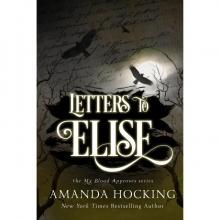 Letters to Elise: A Peter Townsend Novella
Letters to Elise: A Peter Townsend Novella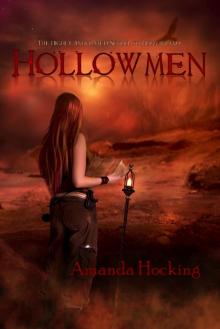 Hollowmen
Hollowmen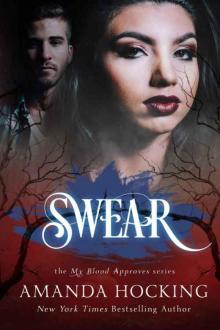 Swear
Swear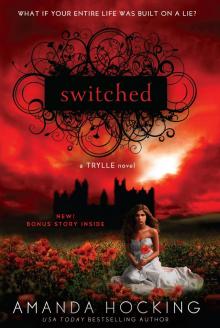 Switched
Switched My Blood Approves
My Blood Approves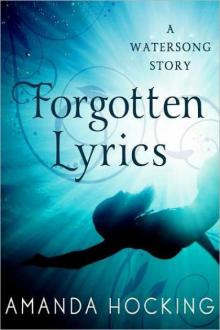 Forgotten Lyrics
Forgotten Lyrics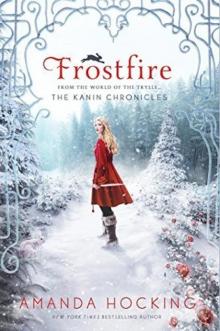 Frostfire
Frostfire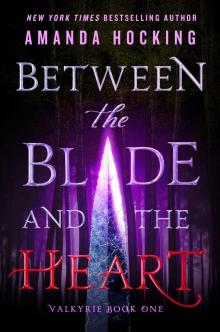 Between the Blade and the Heart
Between the Blade and the Heart Wake
Wake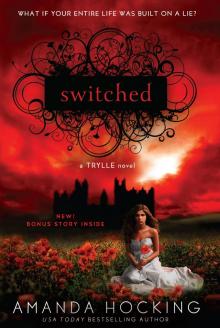 Torn
Torn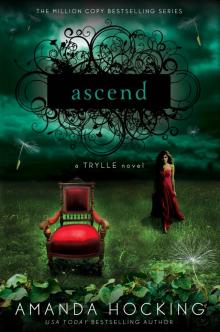 Ascend
Ascend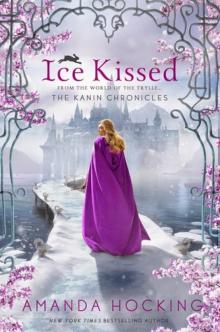 Ice Kissed
Ice Kissed Hollowland
Hollowland Fate
Fate Elegy
Elegy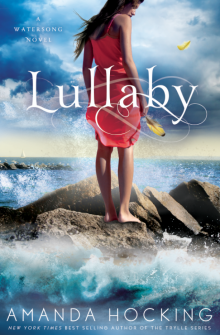 Lullaby
Lullaby Wisdom
Wisdom Tidal
Tidal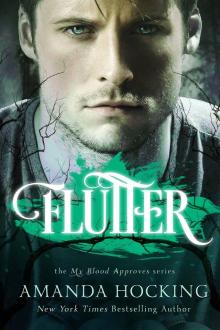 Flutter
Flutter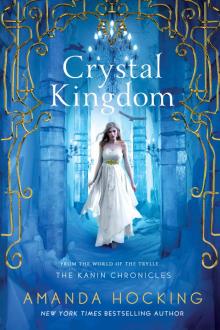 Crystal Kingdom
Crystal Kingdom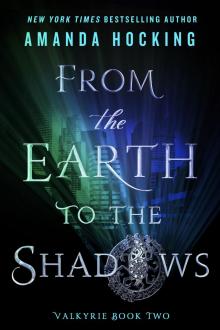 From the Earth to the Shadows
From the Earth to the Shadows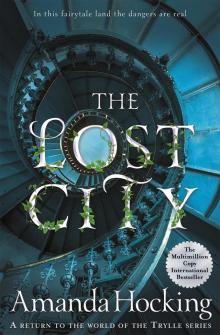 The Lost City
The Lost City The Morning Flower
The Morning Flower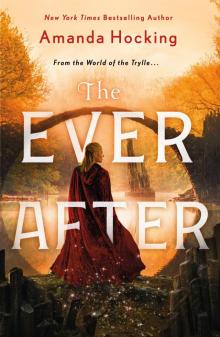 The Ever After
The Ever After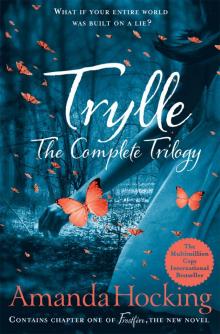 Trylle
Trylle Watersong03 - Tidal
Watersong03 - Tidal Wisdom (My Blood Approves series)
Wisdom (My Blood Approves series) Virtue - a Fairy Tale
Virtue - a Fairy Tale Elegy (Watersong #4)
Elegy (Watersong #4)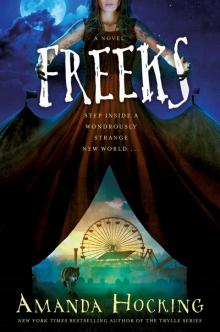 Freeks
Freeks Forgotten Lyrics: A Watersong Story (A Watersong Novel)
Forgotten Lyrics: A Watersong Story (A Watersong Novel)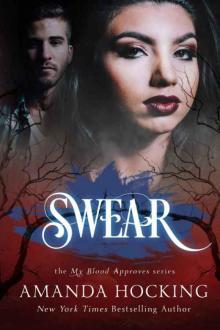 Swear (My Blood Approves #5)
Swear (My Blood Approves #5)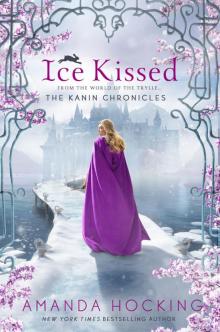 Ice Kissed (The Kanin Chronicles)
Ice Kissed (The Kanin Chronicles) My Blood Approves mba-1
My Blood Approves mba-1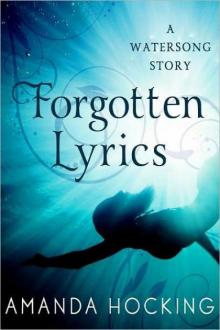 Forgotten Lyrics: A Watersong Story
Forgotten Lyrics: A Watersong Story Lullaby (A Watersong Novel)
Lullaby (A Watersong Novel) Wake (Watersong Novels)
Wake (Watersong Novels) Elegy w-4
Elegy w-4